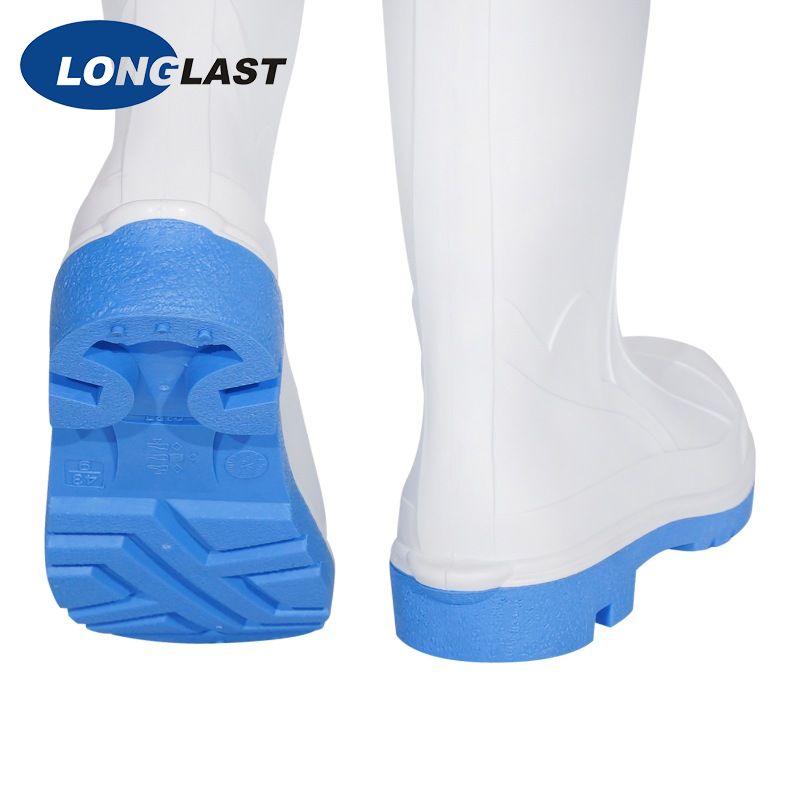How to choose safety boots for food processing
In an era where food safety concerns continue to make headlines, our nation has ramped up its focus on issues surrounding food safety and public health. Numerous incidents during the food processing phase have been widely reported in the media, eliciting concern and discussion across various segments of society. It is in this context that the importance of establishing a clean, hygienic, and orderly food processing chain becomes paramount. Within this framework, the implementation of essential safety and health measures throughout the food processing journey assumes critical importance. One such measure that often goes under the radar but plays a significant role is the use of appropriate food work boots .
The Role of Food Work boots
Safety Food work boots serve as a crucial line of defense in the quest to maintain food hygiene and safety standards. At their core, these specialized footwear items serve to isolate the footsteps of food processors from the consumable food products they handle. As the food industry is inherently vulnerable to contamination and safety risks, governments and regulatory bodies have imposed stringent guidelines and regulations regarding the use of food work boots .
Hygiene and Safety Assurance
One of the primary objectives of food work boots is to ensure the hygiene and safety of food production processes. These boots serve as a protective barrier, effectively preventing cross-contamination during the intricate dance of food processing. By keeping the footprints of workers isolated from the food products, the risk of contamination is significantly reduced. This, in turn, minimizes the chances of foodborne illnesses and ensures that the products reaching consumers are safe for consumption.
Unified Factory Management and Sanitation
A critical aspect of food safety management revolves around maintaining unified factory management standards and stringent cleaning and disinfection protocols. Inadequate cleaning procedures and subpar sanitation can lead to dire consequences, including the spread of pathogens and, in extreme cases, the need for large-scale food recalls. Food work boots , being an integral part of the food processing environment, are not exempt from these standards. In fact, they are subject to stringent cleaning and sterilization procedures to ensure that they do not become potential vectors for contamination. This meticulous attention to cleanliness and hygiene is what separates food work boots from everyday footwear.

Qualities of Effective Food Work boots
Now that we understand the importance of safety boots for food processing , it's crucial to delve into the qualities that make them effective in the food processing industry:
Lightweight and Comfortable: Food work boots must strike a balance between being lightweight, soft, and comfortable. Workers often spend long hours on their feet, and discomfort can lead to reduced productivity and fatigue.
Hygienic Materials: These boots should be constructed from materials that do not shed fibers or contaminants, ensuring that no foreign particles make their way into the food processing chain.
Easy Sterilization: Food work boots need to be easily sterilized to maintain strict hygiene standards. This means they should be resistant to common sterilization methods, such as washing with hot water or exposure to chemicals.
Non-Slip Properties: Slips and falls are a common hazard in food processing areas, which can lead to injuries and contamination risks. Food work boots should possess excellent non-slip properties to mitigate these dangers.
Integrated Design: An integrated surface, devoid of laces or crevices, minimizes the chances of contaminants getting trapped and simplifies the cleaning process.
Resistance to Harsh Substances: Food processing environments often involve exposure to fumes and the use of strong corrosive chemicals like acids and alkalis during the cleaning process. Hence, food work boots need to be resistant to these substances.
Waterproof and Oil-Resistant: Given the prevalence of wet conditions and oil spillage, waterproof and oil-resistant features are essential in food work boots .
Quick Drying: After thorough cleaning, these boots should be able to dry quickly to avoid prolonged downtime for workers.
Material Selection: PVC (Polyvinyl chloride) or TPU (Thermoplastic polyurethane) are commonly used materials in food work shoe construction, owing to their durability and resistance to chemicals.
Anti-Slip Soles: The soles of these boots often incorporate anti-slip design features to enhance worker safety.
Varied Requirements for Different Workspaces
Different production areas within the food processing industry come with their unique challenges and demands. As such, the choice of food work boots may vary according to the specific workspace:
Dry Areas: In sections of the production workshop where dry conditions prevail, food workers may opt for boots with excellent breathability and non-slip properties. These boots keep workers comfortable and stable while handling food products.
Wet Areas: Conversely, wet areas of the production workshop, such as those responsible for handling fresh food, slaughtering, aquatic products, and quick-frozen vegetables, may require workers to don waterproof boots. These boots serve as an impermeable barrier, protecting workers' feet and maintaining hygiene standards in the workspace.
High Cleanliness and Dust Control: In production areas with stringent cleanliness and dust control requirements, the use of anti-static boots is often considered. These boots prevent the buildup of static electricity, which can be hazardous in environments where dust is a concern.
In Conclusion
In summary, professional food work boots represent a vital component in the larger tapestry of food safety and worker health. These specialized footwear items not only facilitate the maintenance of hygiene and cleanliness within food processing rooms but also serve as a safeguard against injuries resulting from slips and falls. As the food industry continues to grapple with evolving safety challenges, the importance of investing in high-quality food work boots cannot be overstated. These boots are not merely a part of the uniform but a critical tool in ensuring that the food on our plates is not just delicious but safe for consumption.


